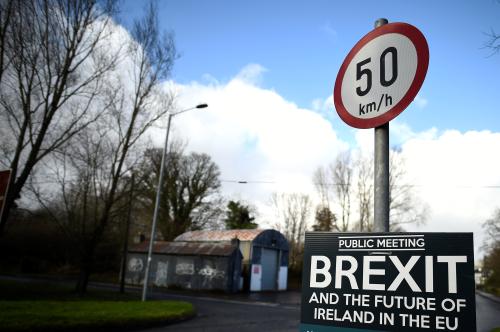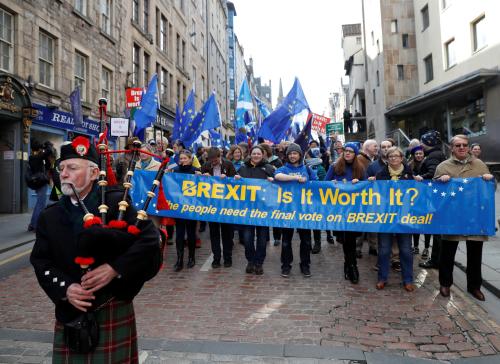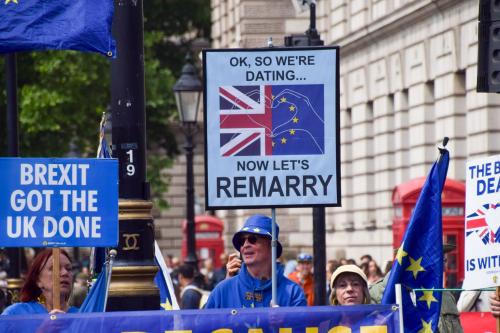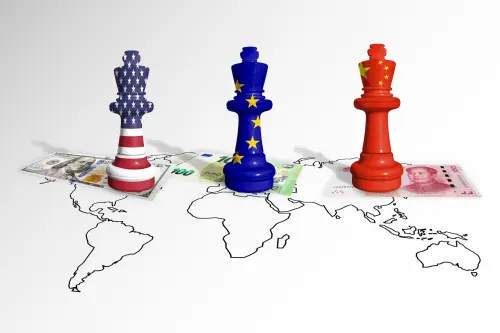With Halloween upon us, British Prime Minister Theresa May needs more than tricks and treats to resolve the dilemmas raised by the United Kingdom’s 2016 vote to leave the European Union. On October 23, Brookings’s Center on the United States and Europe (CUSE) hosted a panel discussion on Brexit and its implications for the U.K., Ireland, and Europe. As noted by moderator Edward Luce of the Financial Times, May has made progress in securing agreements with the EU on questions of money and citizens’ rights, but the key priorities of “not wrecking the Good Friday Agreement” and keeping open the Irish border remain unresolved.
Luce led a conversation with British Ambassador Sir Kim Darroch; Douglas Alexander, who previously served as Britain’s secretary of state for Scotland and shadow foreign secretary; Lucinda Creighton, Ireland’s former minister of state for European affairs; and Amanda Sloat, Robert Bosch Senior Fellow at CUSE and author of the new report “Divided Kingdom: How Brexit is remaking the UK’s constitutional order.”
https://www.youtube.com/watch?v=Ad9aF1GblOg?start=262&end=696
DEAL OR NO DEAL
Ambassador Darroch said the withdrawal agreement “is 95 percent done—we have provisional agreements on money, on the rights of EU citizens living in the U.K. and the rights of U.K. citizens living in Europe,” and most other matters, while the Irish border was “always” going to be “the hardest part.” Darroch argued that the border would be a non-issue “if we get the free trade deal” with the EU, as the contested “backstop” arrangement only applies if negotiations on the future economic relationship are not completed by the end of the transition period in December 2020. “We’re talking about a contingency that we hope never happens,” he emphasized. While “relatively confident” the U.K. will reach a deal with the European Union, the ambassador accepted that the vote in the House of Commons to approve the deal looks tight; but he argued that a text and the consequences of alternatives would “concentrate minds.”
Alexander disagreed, arguing that no majority exists in the House of Commons for any Brexit deal currently under consideration. Northern Ireland’s hardline Democratic Unionist Party (DUP), which props up May’s Conservative government in a confidence and supply deal, and a number of Conservative MPs would likely oppose the government’s deal. “The working assumption in Downing Street seems to be that the Labour Party will step in and save Theresa May,” Alexander argued. He was skeptical this would occur.
https://www.youtube.com/watch?v=Ad9aF1GblOg?start=695&end=910
Creighton argued that Irish Taoiseach Leo Varadkar was right to raise the peace process in Northern Ireland at the European Council meeting in mid-October, though it angered Brexiteers who see the attention given to the issue as scaremongering. “Peace is hard won and it’s very fragile and it’s very easily lost,” she said. “I come from that generation which through our childhood witnessed on our televisions, every single evening, bombs not just in Northern Ireland but also in Britain which devastated people’s lives.” Across the island of Ireland, people “are really concerned about what a no-deal scenario could potentially unleash.”
THE DIVIDED KINGDOM OF GREAT BRITAIN AND NORTHERN IRELAND
The panel discussed at length the impact of the United Kingdom’s exit from the EU on the unity of the country itself—a focus of Sloat’s recent Brookings report. Sloat noted that the only voice from Northern Ireland being heard in Brexit negotiations has been the DUP, as the Northern Ireland Assembly has been suspended for more than 500 days. When she visited Belfast earlier this year, a DUP representative told her the unionist party “recognizes that Northern Ireland has special circumstances,” but “doesn’t want Northern Ireland to be given a special status.” Though a backstop keeping Northern Ireland in the EU customs union while still part of the U.K. could give the region “the best of both worlds economically,” such a status is politically anathema to the DUP.
https://www.youtube.com/watch?v=Ad9aF1GblOg?start=2112&end=2612
Alexander and Sloat both described significant obstacles to another serious push for Scottish independence: Brexit’s example of the complexities involved in political divorce, the Scottish National Party’s losses in the 2017 U.K. general election after a failed independence poll in 2014, and referenda fatigue combined with little change in public opinion. However, Alexander warned of the rise of “English nationalism wrapped in the Union Jack,” arguing that many members and supporters of what is still officially called the Conservative and Unionist Party “have a cavalier disregard for the interests of the integrity of the United Kingdom. In their minds, if the cost of a so-called ‘clean Brexit’ is the breakup of the United Kingdom, then that to them is a price that they would countenance paying.”
As Luce noted in his opening remarks, the coming weeks and months of negotiations will be fraught with “radical uncertainty.” The 700,000-strong People’s March in London on October 20 raised “Remainer” hopes for a potential second referendum, although other observers believe a no-deal Brexit is the more likely outcome. In the face of stronger-than-expected EU27 unity in negotiations, Luce remarked that “Britain’s trick or treating is not going to result in Britain getting any candy. It’s going to be giving candy to Brussels, the question is how much and with what degree of bad will.”
Whatever the arrangement between London and Brussels once Britain leaves the EU next March, the consequences will be far-reaching and lasting for Britain, Ireland, Europe, and beyond.
The Brookings Institution is committed to quality, independence, and impact.
We are supported by a diverse array of funders. In line with our values and policies, each Brookings publication represents the sole views of its author(s).








Commentary
On the brink: The United Kingdom and Ireland prepare for Brexit
October 31, 2018